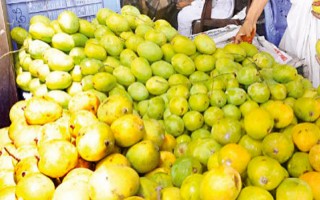Chemically ripened mangoes flood city markets
Immature, chemically ripened mangoes continue to flood markets in the capital in yet another example of food regulators’ failure to enforce laws and High Court orders to protect consumers from harmful foods and ill practices of businesspeople.
Food and consumer rights regulators — Bangladesh Food Safety Authority, Bangladesh Standards and Testing Institution and Directorate of Consumer Rights Protection — are under fire from High Court over sales of substandard packaged foods.
Mango varieties, not supposed to mature until late June, have flooded city markets apparently after being artificially ripened despite High Court orders to prevent untimely plucking of mangoes and their artificial ripening with harmful chemicals.
On April 9, the High Court asked the government to post police at mango orchards to prevent spaying toxic chemicals on mangoes.
On May 20, the High Court asked the authorities to monitor fruit markets and warehouses across the country to prevent artificial ripening of mangoes with harmful chemicals.
A Rapid Action Battalion mobile court on Friday destroyed 2,000kg mangoes of different varieties as their ripened skin hid immature and soft seeds that could easily be broken with mere pressure of fingers.
‘These mangoes are beautiful on the surface but immature inside,’ said Department of Agricultural Extension metropolitan agriculture officer Nur Jahan, who accompanied the mobile court as an expert.
‘These mangoes were artificially ripened,’ she said.
The mobile court destroyed Langra, Banana, Lakshmanbhog and Guti varieties seized from eight shops at a wholesale fruit market at Shah Ali of Mirpur.
Nur Jahan said that Langra and Banana varieties should need at least 25 morre days to mature.
The fruit dealers told the mobile court that their local suppliers at Satkhira, Rajshahi and Chapainawabganj might have used chemicals to ripen the mangoes.
They were fined Tk 6 lakh.
Nur Jahan said that the dealers not only cheated customers by selling uneatable foods but might also harm their health.
On Thursday, a Bangladesh Food Safety Authority mobile court destroyed 1,200kg immature mangoes at Karwan Bazar wholesale fruit market.
On Wednesday, another Rapid Action Battalion mobile court destroyed 16,000kg chemically ripened mangoes and realised Tk 24 lakh as fine from nine dealers at a wholesale fruit market at Jatrabari.
Agriculture extension deputy director in Dhaka Rafiqul Islam Bhuiyan said that artificially ripened mangoes flooded markets across the capital as fruit dealers wanted to multiply profit targeting Ramadan.
He suspected application of calcium carbide in ripening the mangoes for the chemical was known for lending beautiful colour to mangoes.
Use of calcium carbide as ripening agent is banned in Bangladesh.
Rafiqul said that wholesalers were selling mangoes for up to Tk 80 a kg. The retail price ranges between Tk 100 and Tk 150.
He warned consumers not to buy these mangoes and suggested that they became aware of the natural harvesting seasons.
In 2016, the department fixed harvest time for different varieties of mangoes depending on their areas of cultivation in the wake of allegation that mangoes were being ripened with harmful chemicals like formalin and calcium carbide.
Himsagar, which is already on the market, should be harvested from June 12, Mallika from July 1, Khirsapati from June 7, Haribhanga from June 20, Amropali from June 28, Fazli from July 5, Mohanbhog from July 8, Chosha from July 10 and Ashwini from July 20.
Only the harvest of Gobindabhog and Golabkhash is supposed to begin from the second half of this month.
Fruit dealers have been facing for long allegations that they apply carbide to ripen premature mangoes to make extra profit.
Bangladesh Standards and Testing Institution additional director Mohammad Arafat Sarker, however, said that they found no evidence of applying harmful chemicals in ripening mangoes after visiting 15 wholesale fruit markets each of which sold up to 12,000kg mango every day.
Asked about the type of the test done on the mangoes, he said that their tests were conducted on the spot to find the presence of formalin in mangoes.
He, however, never tested if the dealers were using calcium carbide to ripen the fruits.
The Bangladesh Food Safety Authority repeatedly defended dealers over the use of calcium carbide in ripening of fruits. It also caused outrage by saying that use of formalin as artificial fruit ripening agent was a rumour to hurt fruit industry.
Authority chairman Mohammad Mahfuzul Hoque could not be reached for comments.
A Bangladesh University of Engineering and Technology study in 2018 revealed that chemicals popular among Bangladeshi fruit sellers for artificial ripening such as calcium carbide, ethephon, kerosene, and ethylene glycol were of industrial grade and highly contaminated.
The study said that the impurities found in the chemicals might cause acute renal failure, fatal systematic poisoning, burn injury, pulmonary injuries, diarrhoea, permanent skin damage and non-functioning lungs.
News Courtesy: www.newagebd.net











